#rosmertâ
Text

Delu̯âs (idols) for Sucellos, Nantosu̯eltâ, Ogmi̯os, Đîronâ, Carnonon (Cernunnos), Rosmertâ, and Lugus; a horse shoe amd small horse for Eponâ, an owl for Pali̯âcâ (the Cailleach), a black bear for Blau̯umuccumâtîr ("Blue-smoke-mother", the Blue Ridge Mountains deified), a wheel for Taranos, a wood tile with a Brunnos (B Rûnâ) rising out of fire and another with Beith (Ogham B) with a large candle to represent a hearth for Briganti̯â/Brìde, a picture of my Nanaw (grandmother) and some skull beads to represent Ancestors, a small stone with what look like eyes for the Aissus Sîdi (Nature-Spirits, faeries, etc), a hagstone with a small raven feather gifted to me by the raven, a small jar of wolf fur, a piece of birch to represent Bili̯os (the World Tree), a turkey feather in honor of the rightful inhabitants of Northwest Georgia (the Mvskoke and Tsalagi), and an image of all 15 Rûnâs.
#gaulish polytheism#gaulish paganism#gaulish pagan#celtic polytheism#celtic paganism#celtic pagan#southern polytheism#appalachian polytheism#appalachian paganism#appalachian pagan#pagan#polytheist#paganism#polytheism#altar#pagan altar
13 notes
·
View notes
Note
I was wondering if you could point me in the direction of some Gaulish wedding traditions? I would love to incorporate them into a ceremony but haven't had much luck finding info. Thank you in advance!
Hey sorry it took me so long to get back to this!
To be honest I wouldn’t know any resources that could help answer this question, so I took the time to ask Segomaros.
His answer given was:
“The ceremony mostly consists of offerings to the ancestors and Matronae. Brigantiâ, Rosmertâ, and Lugus are also appropriate. There was probably and exchange of gifts comparable to the Irish coibche and tionnscra. The climax of the ceremony should be the bride giving the groom a cup of mead, marking the actual moment of marriage.”
I hope this helped!
3 notes
·
View notes
Text
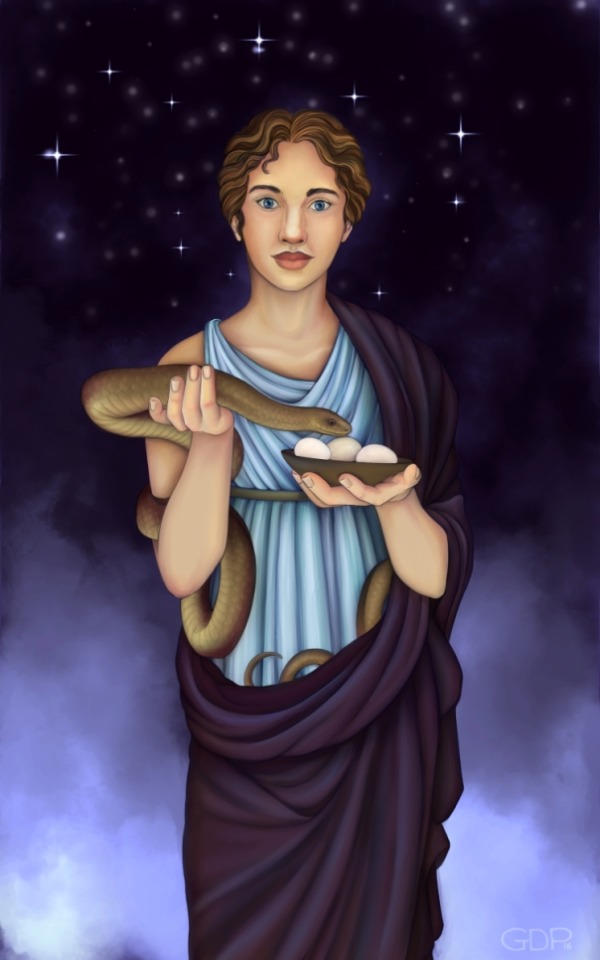
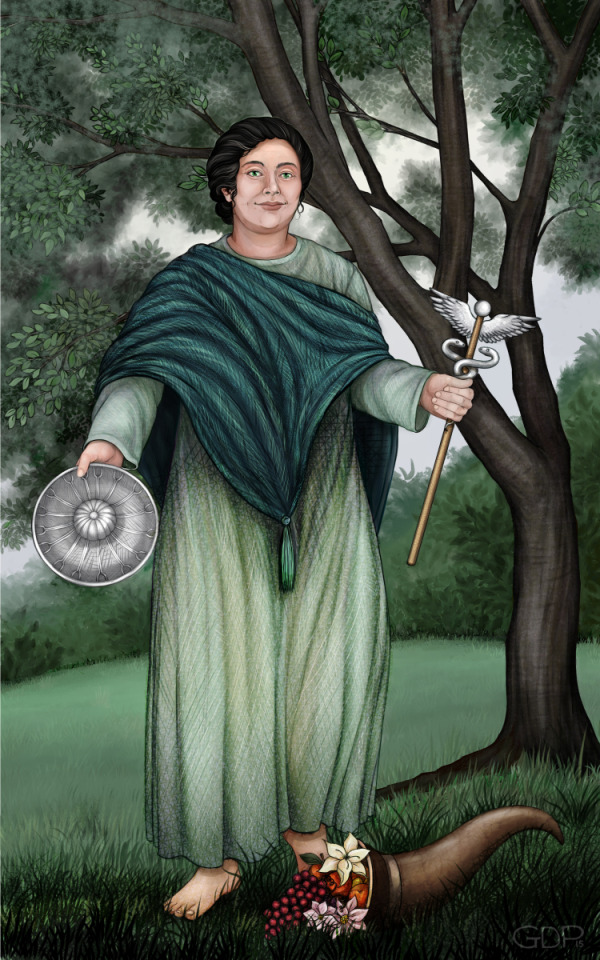

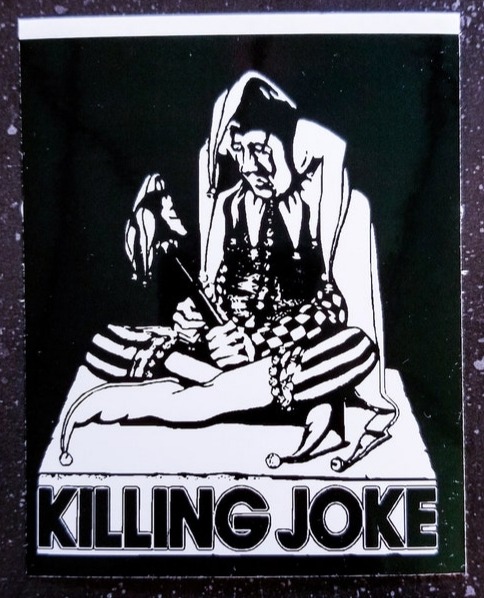
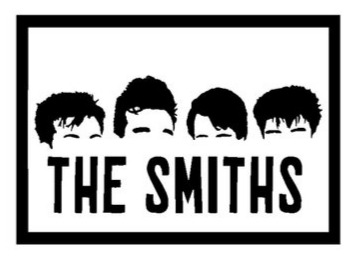
Ordered some prayer cards for my adbertoclâros (altar) and some stickers for my drums today.
#sîronâ#sironâ#sirona#rosmertâ#rosmerta#gaulish polytheism#gaulpol#galatibessus#grace palmer#prayer cards#polytheism#celtic#x-ray spex#xray spex#x ray spex#poly styrene#killing joke#the smiths#punk#punk rock#post-punk#post punk
6 notes
·
View notes
Text
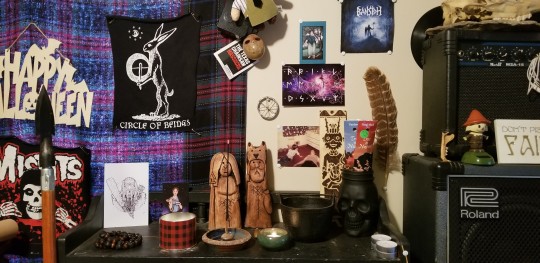




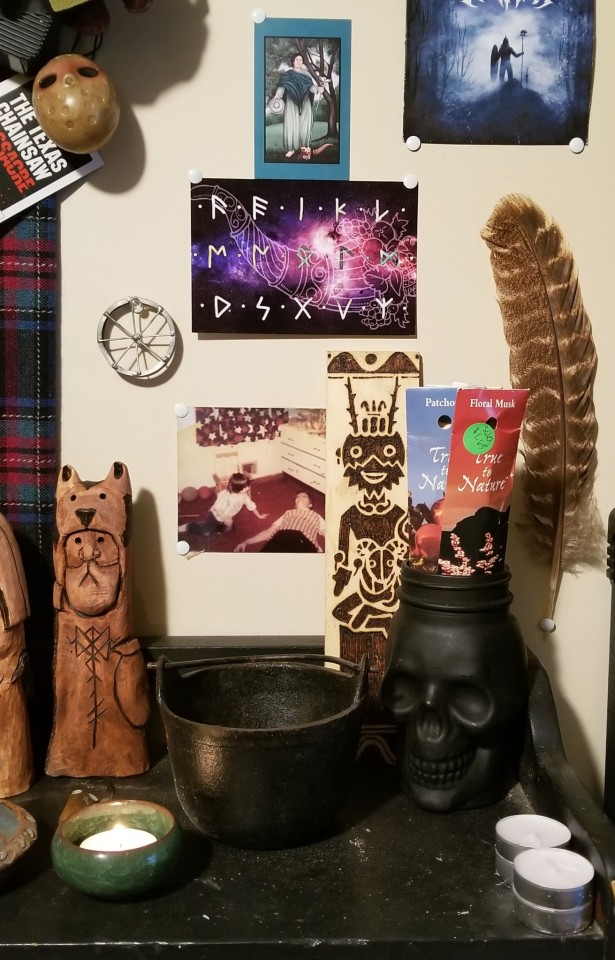

Altar update.
I realized that quite a few of the items were made by people I know and I really like that.
The Sucellos and Nantosu̯eltâ delu̯âs (idols) were made by ThevHelvetian Hands (Artocatos Taranicnos/Carl Grimm).
The Carnonos/Cernunnos delu̯â was made by Selgowiros Caranticnos.
The rûnâs were made by The Carnutian Workshop (Branos Carnutodrûidon).
The incense holder was made by Kim Hughston Vasil.
And the Ogmios delu̯â is a printed out image drawn by Cyril Martin.
Then of course, nearby, are the Bansidh CDs.
#gaulpol#gaulish polytheism#galatibessus#celtic polytheism#helvetian hands#carnutian workshop#cyril martin#bansidh#sucellos#sucellus#nantosuelta#nantosueltâ#carnonos#cernunnos#sirona#sironâ#đironâ#ogmios#rosmerta#rosmertâ#taranis#taranus
3 notes
·
View notes
Text
Watch "Dê(u̯o)cantloi" on YouTube
Songs dedicated to Nantosueltâ, Sucellos, Taranis, Carnonos/Cernunnos, Đîronâ, and Rosmertâ.
#nantosuelta#nantosueltâ#sucellos#taranis#carnonos#cernunnos#sirona#sironâ#rosmerta#rosmertâ#gaulpol#gaulish polytheism#galatibessus#pagan music
3 notes
·
View notes
Text


Rûnoṷelîtiâ ritual (offerings and a prayer to Rosmertâ, and a two-rûnâ reading) and a Rûnoṷegiâ for a family member going through hard times.
#gaulpol#galatibessus#senobessus#gaulish polytheism#divination#prophecy#rosmerta#rosmertâ#runouelitia#rûnouelîtiâ#runouegia#rûnouegiâ#rûnâs#runas
2 notes
·
View notes
Text
Reworked and much-improved version of my devotional song for Rosmertâ, Gaulish goddess of (among other things) Sovereignty, Fate, and Prophecy -- and, by extension, Divination in my practice.
I Chose today to share this because I associate Friday with Her.
Much thanks to my friend Artocatos Taranicnos (Carl Grimm) for letting me use his art for the foundation of the visual that goes with it!
#uailogenos#neofolk#synthfolk#post-folk#post folk#folk#ritual#pagan#rosmerta#rosmertâ#gaulish#gaulpol#celtic#polytheism#personal#goddess#fate#prophecy#divination#darkwave#dark#ambient#dungeon synth#dungeon folk#tribal
6 notes
·
View notes
Text
It's Friday. Friday is Rosmertâ's day -- Dîi̯os Rosmertâs. So I'm sharing the song I recorded for Her.
#Bandcamp#uailogenos#rosmerta#rosmertâ#gaulish polytheism#gaulish#gaulpol#celtic#polytheism#pagan#paganism#neofolk#synthfolk#dungeon folk#dungeon synth#pagan music#pagan folk
1 note
·
View note
Text




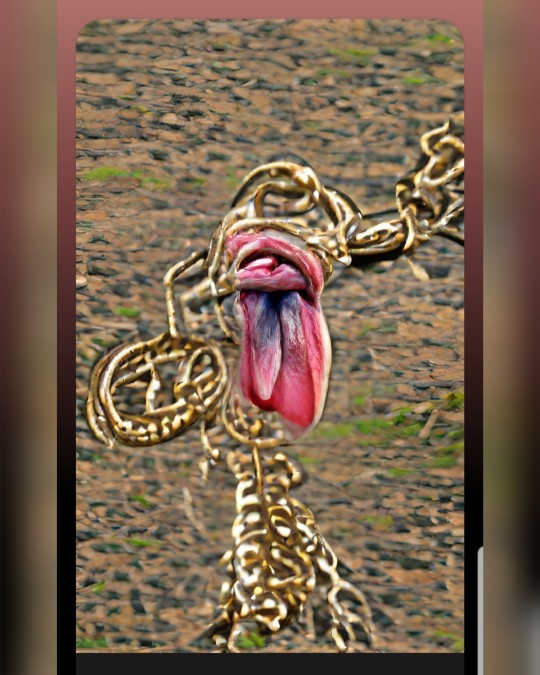


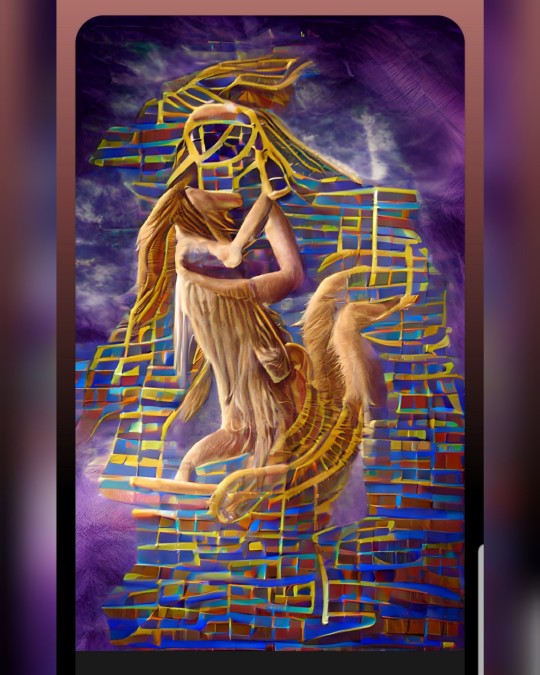


AI representations of Gaulish deu̯î/deu̯oi (gods & goddesses): Nantosu̯eltâ x2, Sucellos x2, Ogmios, Carnonos/Cernunnos, Taranis/Taranus/Tanaros, Rosmertâ, Lugus, Đironâ/Sironâ.
8 notes
·
View notes
Text
My cat that's been inseparable from me since the day she was born went missing for 5 days. As I see Rosmertâ as a goddess of Fate, I asked Her everyday to let her get home safe, and this morning, she did! So here's a small offering in thanks to Her (candle, incense, and song).
3 notes
·
View notes
Text
Watch "Dê(u̯o)cantloi" on YouTube
Songs dedicated to Sucellos, Nantosueltâ, Taranis, Carnonos/Cernunnos, Đironâ/Sironâ, and Rosmertâ.
(Punk, Post-Punk, Neofolk, Dungeon Synth)
#gaulpol#gaulish polytheism#galatibessus#senobessus#punk#postpunk#post punk#neofolk#dungeon synth#sucellos#nantosuelta#cernunnos#carnonos#sirona#rosmerta#taranis
2 notes
·
View notes
Text
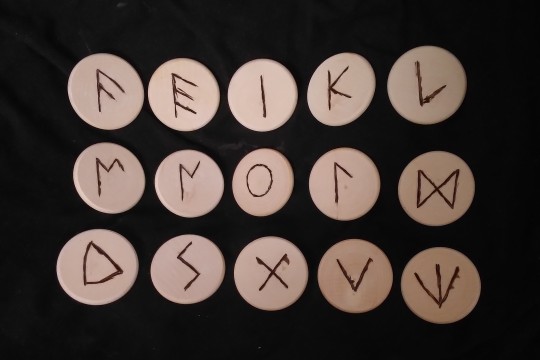

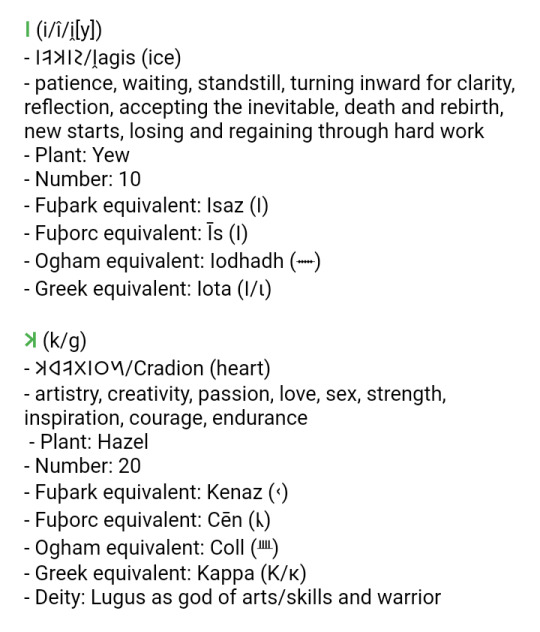


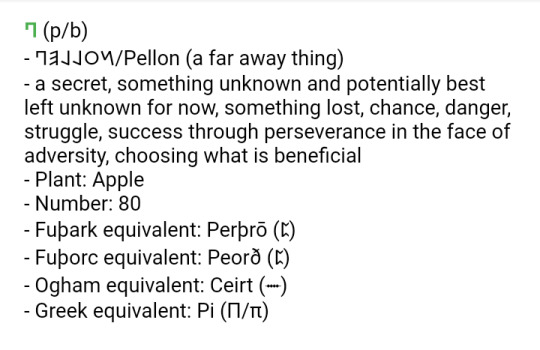
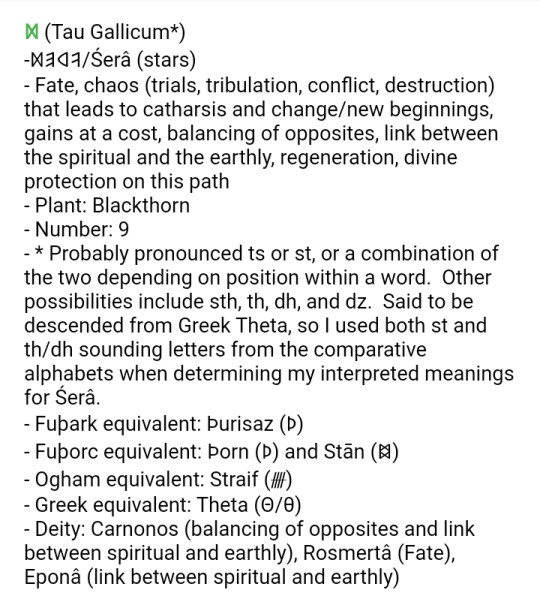
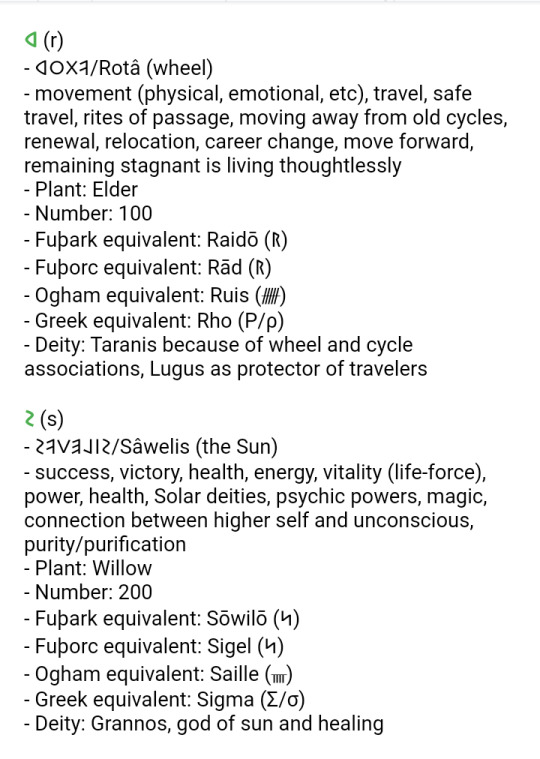
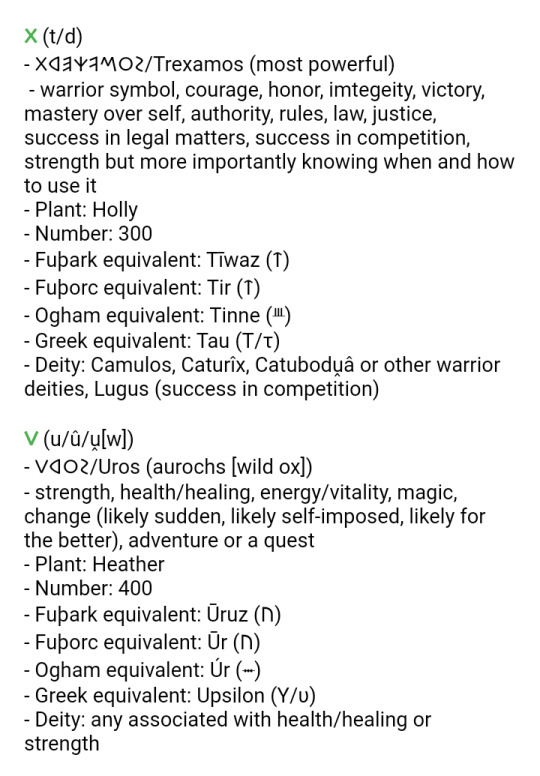
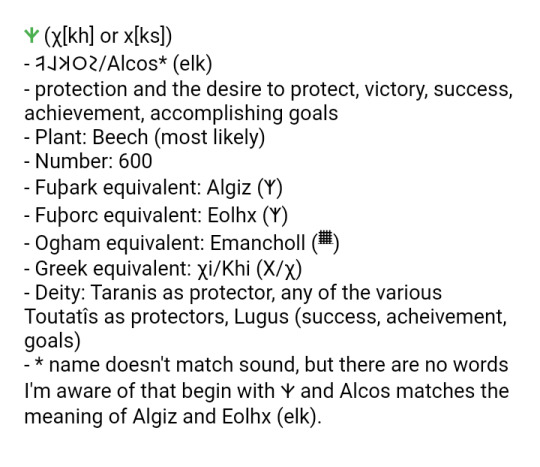
𐌓𐌖𐌍𐌏𐌖𐌄𐌋𐌉𐌢𐌉𐌅/Rûnoṷelîtiâ is a divination system/tool that is similar to and inspired by Norse and Germanic Runes and Insular Celtic Ogham, but designed to be used within a Gaulish Polytheistic framework. The name is comprised of the words 𐌓𐌖𐌍𐌅/rûnâ (secret, mystery) and 𐌖𐌄𐌋𐌉𐌗𐌖𐌔/ṷelîtus (sight, vision) so I have translated it as "secret-seeing". It uses the 15 characters of the Lugano alphabet that I believe are needed to write the Gaulish language. It differs slightly from other, similar Gaulish divination systems in this respect as my version uses the fewest letters. The meanings for each letter were derived by comparing the assigned meanings of their closest equivalents within the Elder Futhark, Anglo-Saxon Futhorc, Ogham, and Greek Oracle divination systems. I also borrowed plant and numerical associations for each letter by borrowing from each letter's Ogham and Greek counterparts. Lastly, where I saw them, I offered possible Deity associations for each letter. I didn't see an obvious association for every letter, and the ones I did offer are only suggestions but certainly not the only possibilities. Thank you to Rosmertâ and Carnonos for inspiration and guidance throughout this! Braton tê, Rosmertâ! Braton tê, Carnone!
#gaulish#gaulish pagan#gaulish paganism#gaulish polytheist#gaulish polytheism#gaulpol#galatis#galatîs#divination#runes#runas#rûnâs#ogham#celtic#celtic polytheism#celtic paganism#celtic pagan#celtic polytheist#druidry#druidism#pagan#paganism#polytheist#polytheism#fortune telling#grammatomancy
41 notes
·
View notes
Text
POTENTIAL GAULISH NAMES FOR
THE DAYS OF THE WEEK
(I completely made this up, but it's backed by evidence.)
1. Diṷos Lugrâs (Moon Day)
or
Diṷos Ðîronâs (Sirona's Day)
2. Diṷos Camuli (Camulos' Day)
or
Diṷos Caturîgi (Caturix' Day)
3. Diṷos Lugous (Lugus' Day)
4. Diṷos Taranês (Taranis' Day)
5. Diṷos Rosmertâs (Rosmerta's Day)
6. Diṷos Sucelli (Sucellos' Day)
7. Diṷos Sâṷeli (Sun Day)
or
Diṷos Granni (Grannos' Day)
Comparisons to other Indo-European languages:
1. - Latin: Diēs Lūnæ (Day of the Moon)
- Spanish: Lunes (derived from
lūna)
- Anglo-Saxon: Mōnandæġ (Moon Day)
- English: Monday
- Old Norse: Mánadagr (Moon Day)
2. - Latin: Diēs Martis (Day of Mars)
- Spanish: Martes (derived from
Martis)
- Anglo-Saxon: Tiwesdæġ (Tiw's Day)
- English: Tuesday
- Old Norse: Týrsdagr (Týr's Day)
- Sanskrit: Maṅgalavāra (Maṅgala's Day)
(Camulos/Caturîχ, Tiw, Týr, and Maṅgala are all deities associated with war. The Romans identified Camulos/Caturîχ, Tiw, and Týr as Mars.)
3. - Latin: Diēs Mercurīī (Day of Mercury)
- Spanish: Miércoles (derived from
Mercurīī)
- Anglo-Saxon: Wōdnesdæġ (Woden's
Day)
- English: Wednesday
- Old Norse: Óðinsdagr (Odin's Day)
(The Romans identified both Woden/Odin and Lugus as Mercury.)
4. - Latin: Diēs Iovis (Day of Jove/Jupiter)
- Spanish: Jueves (derived from
Iovis)
- Anglo-Saxon: Þunresdæġ (Thunor's
Day)
- English: Thursday
- Old Norse: Þórsdagr (Thor's Day)
- Polabian: Perundan (Perun's Day)
(Taranis, Thunor, Doner, Thor, Jove/Jupiter, and Perun are all gods associated with thunder, lightning, storms, and protection.)
5. - Latin: Diēs Veneris (Day of Venus)
- Spanish: Viernes (derived from
Veneris)
- Anglo-Saxon: Frīġedæġ (Frīġe's Day)
- English: Friday
- Old Norse: Frjádagr (Frigg's Day)
(There isn't necessarily an exact Gaulish counterpart to Venus, so I chose to associate Rosmertâ with Friday to parallel Wednesday and Friday being named after Woden/Frīġe and Odin/Frigg. Also, both Rosmertâ and Frīġe/Frigg are associated with Fate and Prophecy.)
6. - Latin: Diēs Saturnī
- Anglo-Saxon:vSunnanæfen (Sun's
Eve), but also Sæterdæġ (Saturn's
Day)
- English: Saturday
(Again, there isn't an exact Gaulish counterpart to Saturn, but He and Sucellos share associations with both agriculture and wealth/abundance.)
7. - Latin: Diēs Sōlis (Day of the Sun)
- Anglo-Saxon: Sunnandæġ (Sun's Day)
- English: Sunday
- Old Norse: Sunnudagr (Sun's Day)
- Sanskrit: Ravivāra or Ādityavāra (Ravi's
Day or Ādityá's Day. [Ravi and Ādityá
are both epithets of Sūrya, a solar
deity.]
5 notes
·
View notes
Text

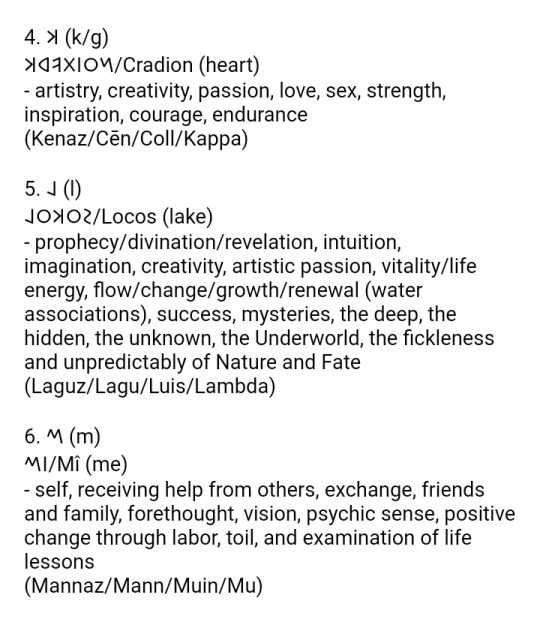

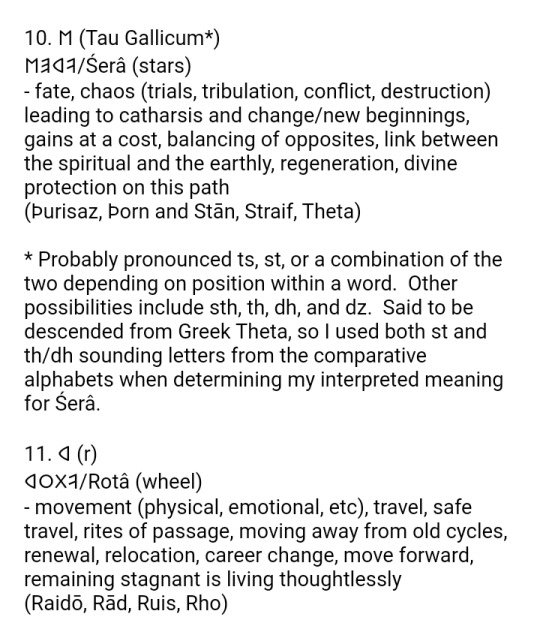

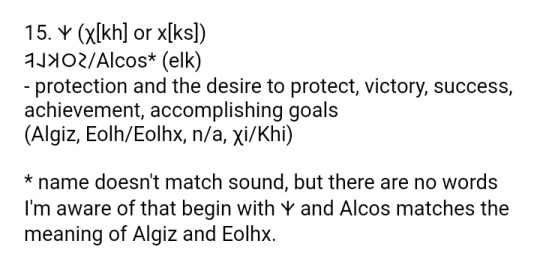
My attempt at making a Gaulish/Lugano divination tool. Admittedly, I did some things rather differently than others who have undertaken this project before me did, but I was just trying to do what I felt Rosmertâ was asking of me. Also, I've bought the materials, but I haven't actually gotten around to making physical Rûniâs yet. (And yes, Rûnâ is related to the Old Norse word Rune and they both mean "secret".)
#pagan#paganism#polytheist#polytheism#celtic#gaulish#lugano#lugano script#celtic paganism#celtic polytheism#celtic pagan#celtic polytheist#gaulish pagan#gaulish paganism#gaulish polytheist#gaulish polytheism#gaulpol#galatis#galatîs#divination#runias#rûniâs#runes#grammatomancy#rosmerta#rosmertâ
13 notes
·
View notes
Text
Gonna do this largely because I'd be interested in seeing others do the same. As a hard Polytheist I believe in all deities, but the ones who play a pretty much everyday role in my life are:
- Carnonos/Cernunnos
- Nantosueltâ
- Sucellos
- Taranis
- Brigantiâ/Brigid/Brigindo
- Lugos/Lugus/Lugh/Llew
- Rosmertâ
- Ogmios
And I've been feeling stronger and stronger pulls to Eponâ, Đîronâ/Sirona, and Grannos.
#pagan#paganism#polytheist#polytheism#celtic#gaulish#celtic pagan#celtic paganism#celtic polytheism#celtic polytheist#gaulish polytheism#gaulish polytheist#gaulpol#galatis#galatîs#cernunnos#nantosuelta#sucellus#taranis#brigantia#brigid#lugus#lugh#llew#rosmerta#epona#sirona#grannos#grannus#sucellos
13 notes
·
View notes
Text
Watch "Dê(u̯o)cantloi" on YouTube
Songs dedicated to Sucellos, Nantosueltâ, Taranis, Carnonos/Cernunnos, Đironâ, and Rosmertâ.
(Punk, Post-Punk, Neofolk, Dungeon Synth)
0 notes